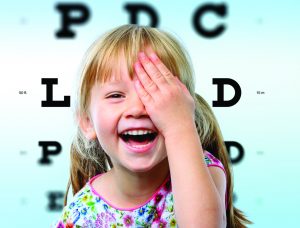By Walesby Vision Center
 People of all ages, from children to the elderly, need to regularly have their eyes examined by a respected, licensed Optometrist. Examinations for vision impairments, ocular health, and disease of the eye are imperative and should be considered a top priority. Walesby Vision Center takes eye exams to the next level by also testing binocular vision ability, ensuring that every patient is able to use the two eyes together as a team to acquire and process visual information properly.
People of all ages, from children to the elderly, need to regularly have their eyes examined by a respected, licensed Optometrist. Examinations for vision impairments, ocular health, and disease of the eye are imperative and should be considered a top priority. Walesby Vision Center takes eye exams to the next level by also testing binocular vision ability, ensuring that every patient is able to use the two eyes together as a team to acquire and process visual information properly.
Adult Eye Exams
It is essential to get your eyes examined annually to prevent irreversible deterioration of your visual system. Many conditions of the eye go unnoticed until it’s progressed to advanced stages. For example, glaucoma is a sight stealer; in fact, it’s often referred to as, “the sneak thief of sight.” There are usually no symptoms, and once vision is compromised, it’s unable to be restored. Without the patient even noticing, glaucoma can cause up to 40% of permanent vision loss, and if left untreated it will cause blindness. Because there are little to no symptoms, out of the 3 million Americans that suffer from Glaucoma, half of them are unaware that they have it.
In adults, it’s most common to experience conditions like dry eye and presbyopia (near vision impairment) in your 40’s, and cataracts, glaucoma or retinal disease like macular degeneration in your 50’s and beyond. Although some adults can have age-related myopia (near-sightedness), its most commonly contributed to development and growth of the eye as a child.
Children’s Eye Exams
Children’s eyes that are elongated, or those that have curved corneal lenses, are at high risk of developing myopia. Vision tests, which are commonly performed at schools, do not always detect myopia and other visual impairments. Only an Optometrist performing specific eye examinations can identify and treat vision disorders and diseases of the eye.
Wearing glasses, or regular contact lenses will certainly help children to see more clearly temporarily, but does not treat the progression of myopia.
As they continue to age, their vision will become more and more impaired, requiring stronger prescription strength glasses or lenses. Specific types of contact lenses, prescribed by a myopia specialist, can slow down the rate that myopia develops.1
According to the American Optometric Association, multifocal contact lenses for children with myopia can slow the progression of nearsightedness; providing a more effective and efficient treatment option.2 The specialists at Walesby Vision Center treat myopia with these advanced contact lenses.
Catching Visual Issues Early
To diagnose and treat visual issues early, like myopia, amblyopia (lazy eye) and strabismus (misalignment of the eye), it is suggested that all children should have their vision checked three times before entering school: 6 months old, 3 years old and 5 years old. Walesby Vision Center
is a proud participant of our At First Sight Program, offering free eye exams to infants under 12 months old.
Going Beyond the Average Eye Exam
While the practice does offer full-spectrum eye care for the entire family, their doctors are Fellowship trained Developmental Optometrists. They are experts in Comprehensive Developmental Optometry, which focuses on the entire visual system. Walesby Vision Center takes significant additional steps with every eye exam by also testing each patient’s binocular vision. They have been able to help thousands of patients improve their ability to acquire and process visual information by offering unmatched vision therapy services to treat binocular vision dysfunctions.
Why is Binocular Vision Dysfunction
Testing Important?
For children and adults with learning disabilities, cognitive decline, ADD, ADHD and learning dis-
orders, vision therapy encompasses not only strengthening the eye muscles, but also improving visual perception, visual processing, visual fluency, and hand-eye coordination. While it does improve eye muscle strength, it’s better described as enhancing the complete visual and cognitive process. The Fellowship trained Developmental Optometrists at Walesby Vision specialize in vision therapy.
Vision therapy works by retraining the brain in response to external stimuli. There have been multiple studies on children and adults with cognitive deficiencies and learning complications. During the studies, the diagnostic testing shows increased gray matter in the brain of the examined patients. This testing suggests brain structure regeneration occurs with vision training, as well as an uptake in increased learning abilities.
Walesby Vision Center incorporates binocular vision dysfunction testing in every eye examination that they perform.
Walesby Vision Center specializes in diagnosing and treating eye and vision disorders in infants to adults. They are the only Fellowship trained Developmental Optometrists in this area that examine and treat all ages and specialize in pediatrics. Their devoted staff is trained to work with each Patient’s specific needs. Your entire family can trust their eye health and vision care to Walesby Vision Center.
To schedule an appointment for you or your family’s eye exam, please call Walesby Vision Center today.
References
1. Sankaridurg P. Fitting Multifocal Contact Lenses for Myopia Control. Review of Cornea and Contact Lenses. February 2017.
2. American Optometric Association. Multifocal contact lens effective at treating myopia in kids. Available at: https://www.aoa.org/news/clinical-eye-care/multifocal-contact-lens-effective-at-treating-myopia-in-kids.
WALESBY Vision Center
www.walesby3d.com
Tampa Office
2510 West Waters Ave.
Tampa, FL 33614
(813) 915-0755
Lutz Office
24444 State Road 54
Lutz, FL 33559
(813) 345-8544
Check Also
Revolutionizing Healthcare: Exploring Regenerative Medical Treatments at QC Kinetix
By Daniel Sucherman, MD In recent years, the field of regenerative medicine has emerged as …
 Central Florida Health and Wellness Magazine Health and Wellness Articles of the Villages
Central Florida Health and Wellness Magazine Health and Wellness Articles of the Villages


